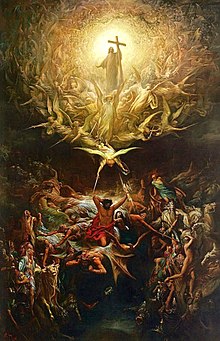
Paganism is commonly used to refer to various religions that existed during Antiquity and the Middle Ages, such as the Greco-Roman religions of the Roman Empire, including the Roman imperial cult, the various mystery religions, religious philosophies such as Neoplatonism and Gnosticism, and more localized ethnic religions practiced both inside and outside the empire. During the Middle Ages, the term was also adapted to refer to religions practiced outside the former Roman Empire, such as Germanic paganism, Egyptian paganism and Baltic paganism.
From the point of view of the early Christians, these religions all qualified as ethnic (or gentile, ethnikos, gentilis, the term translating goyim, later rendered as paganus) in contrast with Second Temple Judaism. By the Early Middle Ages (800–1000), faiths referred to as pagan had mostly disappeared in the West through a mixture of peaceful conversion, natural religious change, persecution, and the military conquest of pagan peoples; the Christianization of Lithuania in the 15th century is typically considered to mark the end of this process.